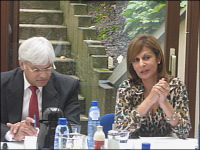Registration
You will receive an email confirming your registration.
IMGXYZ1023IMGZYXOngoing violence in Pakistan serves as a constant reminder of the immense challenges facing President Asif Ali Zardari. U.S. efforts to effectively balance security and policy imperatives in this volatile region have not succeeded. The U.S. and Europe can develop a successful new strategy if they engage directly with Pakistan’s civil society while continuing to recognize the military’s importance.
No Good Choices
Ashley J. Tellis explained that the U.S. can succeed in stabilizing Pakistan if it engages with the country in contexts outside of the War on Terror. Tellis emphasized the importance of addressing the complex civil-military relations that govern domestic politics.
The military has too much power in Pakistan, and the current pattern of U.S. engagement only serves to strengthen its position. Tellis advised balanced strategy that engages and strengthens civil leadership while recognizing the military’s continuing importance. This two-fold approach will allow the U.S. to articulate security imperatives more effectively, and help achieve long-term political stability.
Tellis cautioned the U.S. government against making aid and engagement conditional, lest this reinforces existing mistrust and anti-American sentiment. He recognized that it will take a long time to achieve positive results but it is the best strategy option in a situation where there are no good choices.
Mutual Focus
Shada Islam offered a perspective as a Pakistani and a critical observer of EU policy. It is true that the military is strong within Pakistan, but it is discredited due to low morale and high casualties. The Pakistani government’s receptiveness to advice and new approaches aimed at solving its instability problems presents an opportunity for the international community. But Europe’s dismissive opinion of Pakistan as a poor developing country hinders progress.
Islam stressed the importance of Europe and Pakistan developing areas of mutual interest, pointing out that current anti-American sentiment in Pakistan presents an opportunity for Europe to play a key role in promoting a more open and stable society. For example, a free trade agreement between the EU and Pakistan could give Pakistan’s economy a needed boost while providing Europe with leverage to help influence domestic policies. She further highlighted the need for the EU, as well as the U.S., to develop a strategy for engagement which is both proactive and multi-faceted, encouraging and strengthening civilian leaders and NGOs while engaging with the military.
She concluded that the border between Pakistan and Afghanistan is so fluid that the problems of the two countries cannot be treated as separate issues. A huge influx of aid and vocational training is needed in the FATA in order to challenge extremism.
Questions & Answers
Contesting the notion of the EU’s lack of engagement, a participant raised the point that Pakistan is increasingly visible in EU foreign policy during every discussion on Afghanistan. The real issue is how to encourage each of the 27 Member States to fully participate in finding a solution.
Another participant questioned the assumption that the military in Pakistan is a cohesive entity, which bears significance when considering how to engage the army. Tellis responded by outlining two hurdles to engagement: deeply conservative attitudes within the Pakistani army and the large scale of logistical operations. When focusing on FATA specifically, it is important to recognize that historically Pakistan was governed by a tribal power structure that has diminished since the 1980s. Tellis stressed the importance of differentiating the established tribes from the insurgents in the FATA. Shada Islam agreed with this point, confirming the importance of negotiating with the tribes rather than with the militia.
A participant noted that Pakistani elites appear to underestimate the threat of extremism and fundamentalism, and asked how, and indeed if, it is possible to encourage the political parties and fragmented leadership to work together to combat terrorism.
Tellis replied that civilians in Pakistan have a conceptual understanding that there is an enemy within, but their attention is diverted to other issues, thus there have been real limitations on the confrontation of extremism. There is a lack of resources to tackle problems on this kind of scale, and the military is too strong and unwilling to create a comprehensive approach. The lack of a strong civil society compounds this problem.
Islam commented that even within the last year the mood amongst civilians in Pakistan has changed significantly thanks to the influence of the internet. She stressed the importance of promoting vocational training as a way to empower citizens in the FATA and build democracy.
Echoing Islam’s earlier point, a participant went on to comment that the EU is not in a position to invest heavily in Pakistan; therefore a key strategy should be to encourage trade. Tellis advised against negotiating on a Free Trade Agreement as this would be too hard to accomplish. Instead he argued that building democracy needs to be considered the primary objective in Pakistan. Islam disagreed, and urged once more that the EU to pass a trade agreement.
